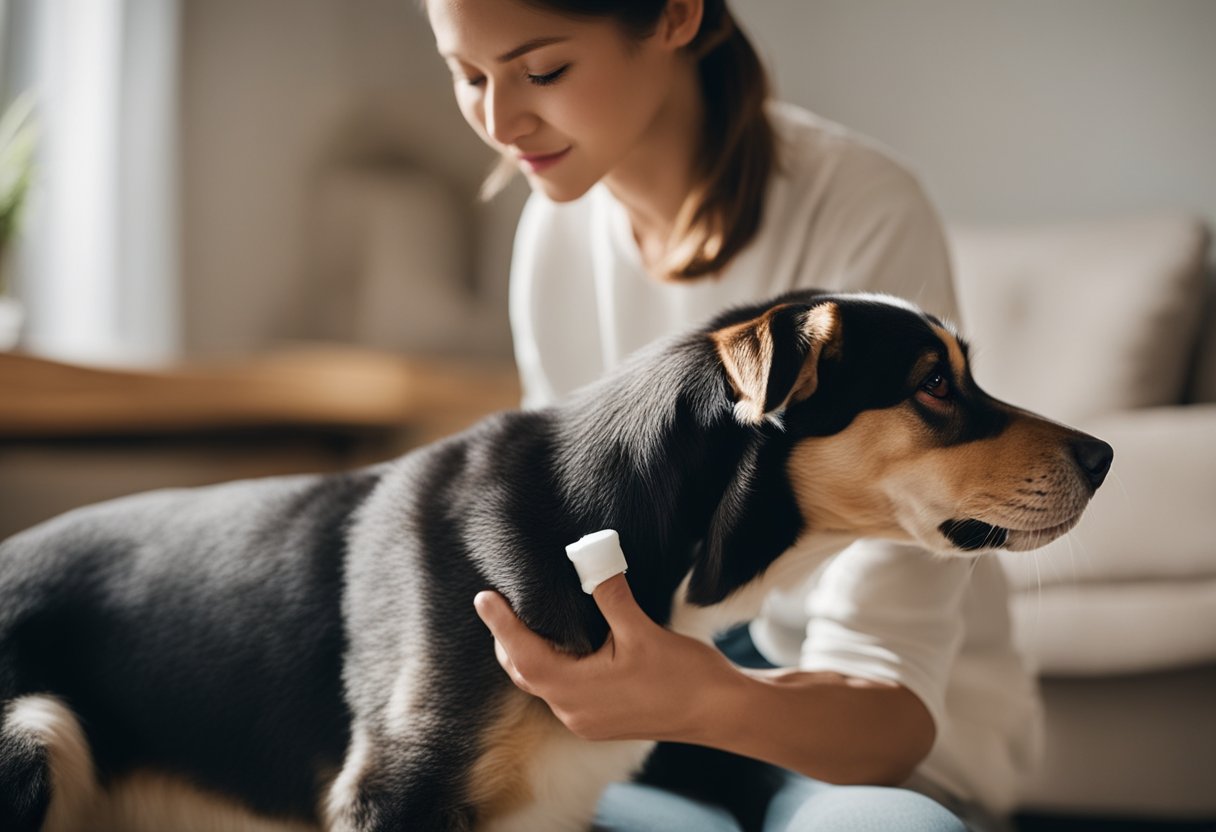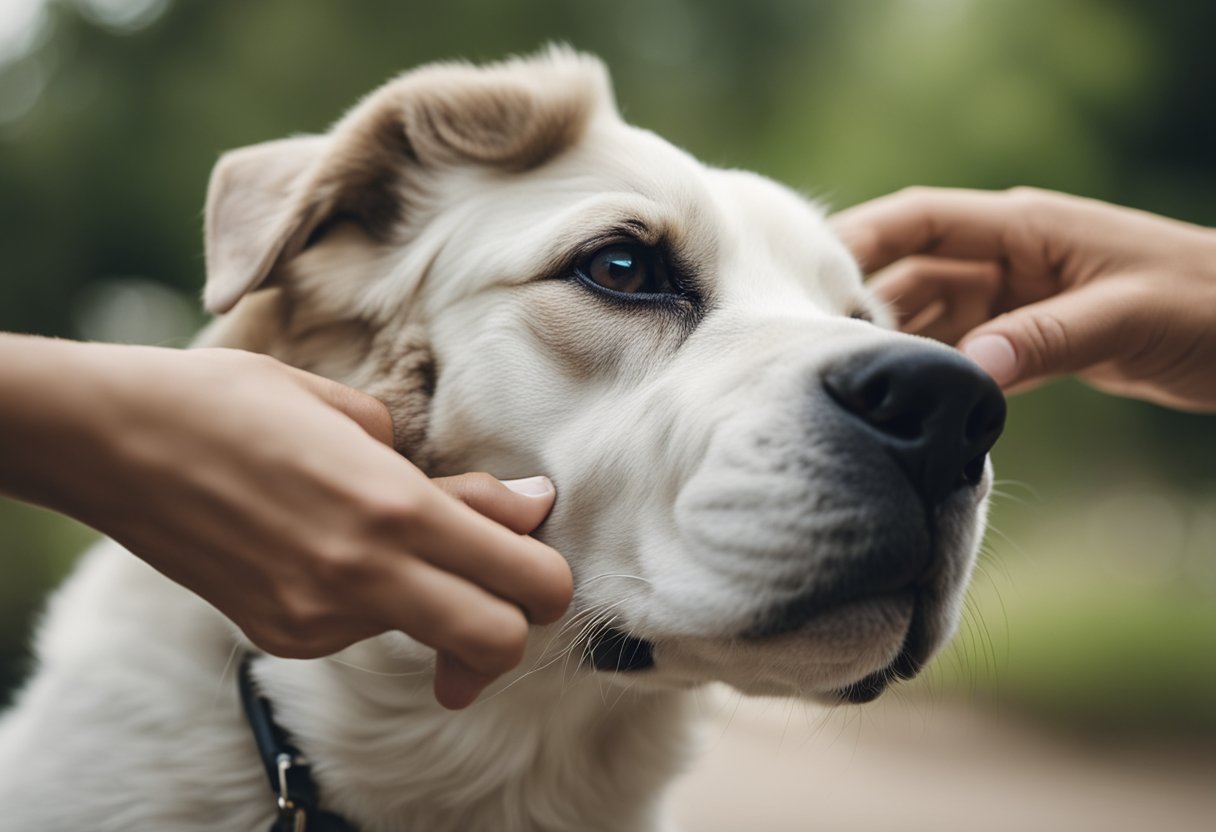Relief for Your Dog’s Itchy Skin: Effective Solutions to Soothe Your Pup’s Discomfort
If you have a furry friend, you know that itchy skin can be a common issue for dogs. It’s important to understand the underlying causes of your dog’s itchy skin in order to provide the most effective relief. From allergies to skin infections, there are various factors that can contribute to your dog’s discomfort.

When it comes to treating your dog’s itchy skin, there are several approaches you can take. From regular grooming and bathing to using specialized shampoos and supplements, finding the right solution for your dog’s specific needs is essential. By addressing your dog’s itchy skin proactively, you can help alleviate their discomfort and improve their overall well-being.
Key Takeaways
- Understanding the underlying causes of your dog’s itchy skin is crucial for effective relief.
- Regular grooming, bathing, and the use of specialized shampoos and supplements can help alleviate your dog’s discomfort.
- Proactive measures can contribute to improved well-being for your furry friend.
Understanding Itchy Skin in Dogs

If your dog is constantly scratching, licking, or biting their skin, they may be suffering from itchy skin. Itchy skin, also known as pruritus, is a common problem in dogs that can be caused by a variety of factors.
Causes of Itchiness
Itchy skin in dogs can be caused by a range of factors, including:
- Allergies: Dogs can develop allergies to various things, including food, pollen, dust, and flea bites. Allergies can cause itchy skin, as well as other symptoms like sneezing, coughing, and watery eyes.
- Parasites: Fleas, ticks, and mites can all cause itchy skin in dogs. These parasites can bite and irritate your dog’s skin, causing them to scratch and bite at themselves.
- Skin infections: Bacterial or fungal infections can cause itchy skin in dogs. These infections can develop on their own or as a result of an underlying condition like allergies or parasites.
- Dry skin: Just like people, dogs can develop dry skin that can be itchy and uncomfortable. This can be caused by a lack of moisture in the air, as well as bathing your dog too frequently with harsh shampoos.
- Hormonal imbalances: Hormonal imbalances, such as an underactive thyroid or Cushing’s disease, can cause itchy skin in dogs.
Recognizing Symptoms
Itchy skin can cause a range of symptoms in dogs, including:
- Scratching, licking, or biting: If your dog is constantly scratching, licking, or biting their skin, it’s a sign that they are uncomfortable and may be suffering from itchy skin.
- Red, inflamed skin: Itchy skin can cause your dog’s skin to become red, inflamed, and irritated.
- Hair loss: If your dog’s itchy skin is severe, they may scratch and bite at themselves so much that they begin to lose hair in the affected areas.
- Foul odor: If your dog’s itchy skin is caused by a bacterial or fungal infection, it may produce a foul odor.
If you notice any of these symptoms in your dog, it’s important to take them to the vet for a proper diagnosis and treatment.
Treating Your Dog’s Itchy Skin

If your dog is constantly scratching or biting at their skin, they may be suffering from itchy skin. Itchy skin can be caused by a variety of factors, including allergies, parasites, and skin infections. Fortunately, there are several ways to treat your dog’s itchy skin and provide them with relief.
Home Remedies
There are several home remedies that can help soothe your dog’s itchy skin. One effective remedy is an oatmeal bath. Oatmeal is known for its anti-inflammatory properties and can help to reduce itching and irritation. To make an oatmeal bath, simply mix a cup of oatmeal with warm water and let your dog soak in the mixture for 10-15 minutes.
Another effective home remedy for itchy skin is apple cider vinegar. Apple cider vinegar has anti-inflammatory and antiseptic properties that can help to reduce itching and irritation. To use apple cider vinegar, dilute it with equal parts water and apply it to your dog’s skin using a spray bottle.
Medical Treatments
If home remedies are not effective in treating your dog’s itchy skin, your veterinarian may recommend medical treatments. One common medical treatment for itchy skin is the use of medicated shampoos. These shampoos contain ingredients that can help to reduce itching and inflammation.
Your veterinarian may also prescribe antihistamines or steroids to help reduce itching and inflammation. In some cases, antibiotics may be necessary to treat underlying skin infections.
Preventative Measures
Preventing itchy skin in dogs is often easier than treating it. One important preventative measure is to keep your dog’s skin and coat clean and healthy. Regular grooming and bathing can help to prevent skin infections and other skin problems.
Another important preventative measure is to identify and avoid allergens that may be causing your dog’s itchy skin. Common allergens include pollen, dust, and certain foods. If you suspect that your dog has an allergy, talk to your veterinarian about allergy testing and treatment options.
By following these home remedies, medical treatments, and preventative measures, you can help to provide your dog with relief from itchy skin and improve their overall quality of life.
Resources

When it comes to finding relief for your dog’s itchy skin, there are several resources available that can provide valuable information and guidance. Websites such as Great Pet Care and The Spruce Pets offer comprehensive guides on home remedies and products for relieving your dog’s itching. These sources provide insights into the benefits of using colloidal oatmeal and apple cider vinegar to soothe your dog’s irritated skin.
Additionally, you can explore holistic care options for your dog’s skin issues through platforms like Only Natural Pet that offer herbal remedies and natural dog products, ensuring a safer alternative for your pet. These resources can provide you with the knowledge and confidence to address your dog’s skin issues effectively.
Conclusion

In conclusion, there are many ways to provide relief for your dog’s itchy skin. By addressing the underlying causes of the itchiness, such as allergies or parasites, you can help to prevent future discomfort for your furry friend.
One effective method is to use natural remedies such as oatmeal baths or apple cider vinegar sprays. These can help to soothe the skin and reduce inflammation without the use of harsh chemicals.
Another important aspect of managing your dog’s itchy skin is to maintain good hygiene practices. Regular baths, nail trims, and ear cleanings can help to keep your dog’s skin healthy and prevent infections.
It is also important to consult with your veterinarian if your dog’s itchiness persists or if you notice any other concerning symptoms. They can help to diagnose and treat any underlying conditions and provide additional advice on managing your dog’s skin health.
Overall, with a combination of natural remedies, good hygiene practices, and veterinary care, you can help to provide relief for your dog’s itchy skin and keep them happy and healthy.
Frequently Asked Questions

What home remedies can help soothe my dog’s itchy skin?
There are several home remedies that can help soothe your dog’s itchy skin. One of the most effective is oatmeal. You can make an oatmeal bath for your dog by grinding up plain, unflavored oatmeal into a fine powder and adding it to lukewarm water. Another option is to apply aloe vera gel directly to your dog’s skin. Aloe vera has anti-inflammatory and soothing properties that can help relieve itching and irritation.
Which oral medications are effective for a dog’s itchy skin?
There are several oral medications that can be effective in treating a dog’s itchy skin. Antihistamines, such as Benadryl, can help reduce itching by blocking the release of histamines in the body. Steroids, such as prednisone, can also be effective in reducing inflammation and itching. However, it is important to consult with your veterinarian before giving your dog any medication.
How do I make a homemade anti-itch spray for my dog?
You can make a homemade anti-itch spray for your dog by mixing equal parts apple cider vinegar and water in a spray bottle. You can also add a few drops of essential oils, such as lavender or peppermint, to help soothe your dog’s skin. However, it is important to test the spray on a small patch of your dog’s skin before using it all over to ensure that your dog does not have an adverse reaction.
What is the most effective anti-itch medicine available for dogs?
The most effective anti-itch medicine for dogs will depend on the underlying cause of the itching. Your veterinarian may prescribe a medication, such as Apoquel or Cytopoint, to help relieve itching caused by allergies. In some cases, a medicated shampoo or topical cream may also be effective in reducing itching and irritation.
What diet changes can alleviate a dog’s itchy skin?
Diet changes can be effective in alleviating a dog’s itchy skin, particularly if the itching is caused by a food allergy. Your veterinarian may recommend a hypoallergenic diet or a diet that is free from common allergens, such as beef, chicken, and dairy products. Adding omega-3 fatty acids to your dog’s diet can also help reduce inflammation and itching.
What over-the-counter options are safe for treating my dog’s itching?
There are several over-the-counter options that are safe for treating your dog’s itching. Oatmeal-based shampoos and conditioners can help soothe and moisturize your dog’s skin. You can also use a topical cream or spray that contains hydrocortisone to help reduce itching and inflammation. However, it is important to consult with your veterinarian before using any over-the-counter medication or product on your dog.
